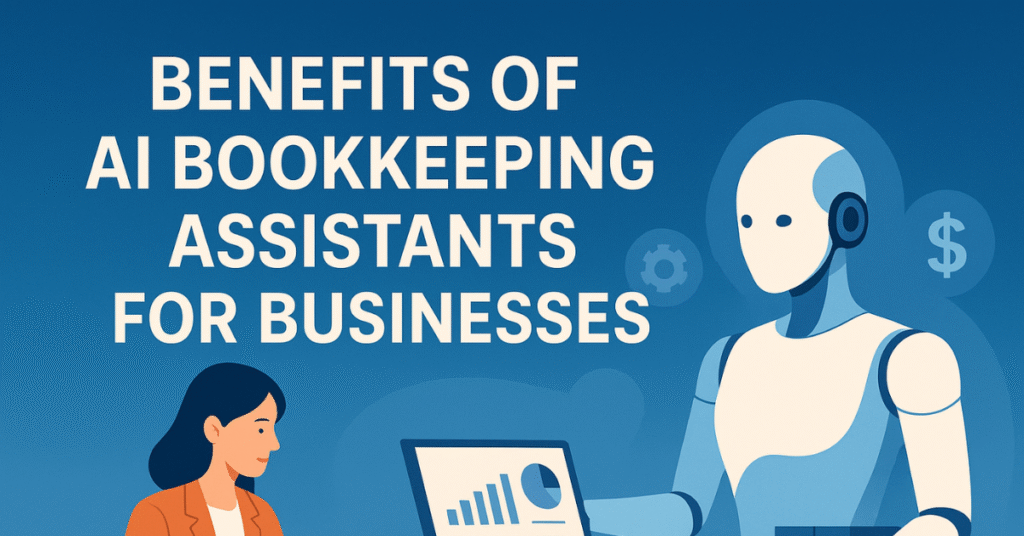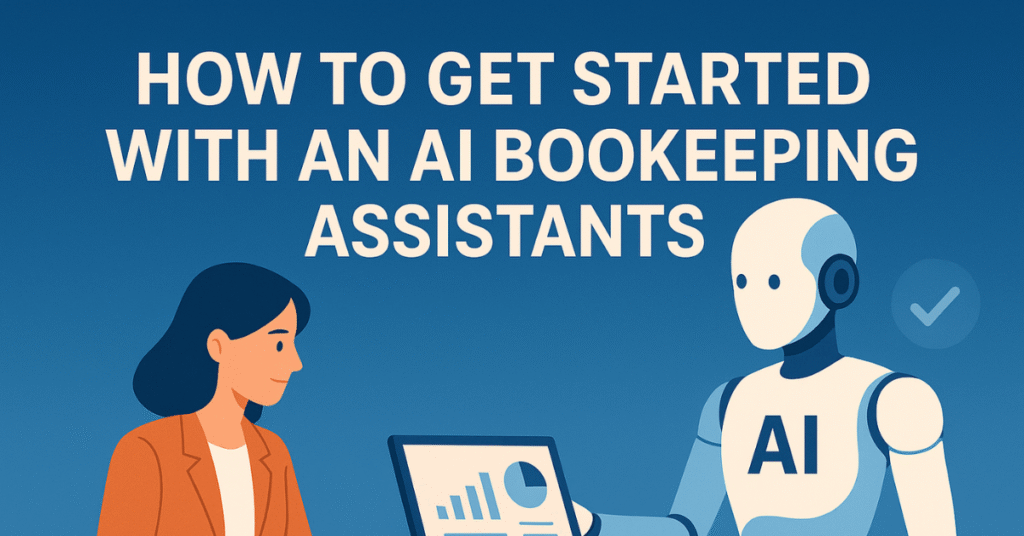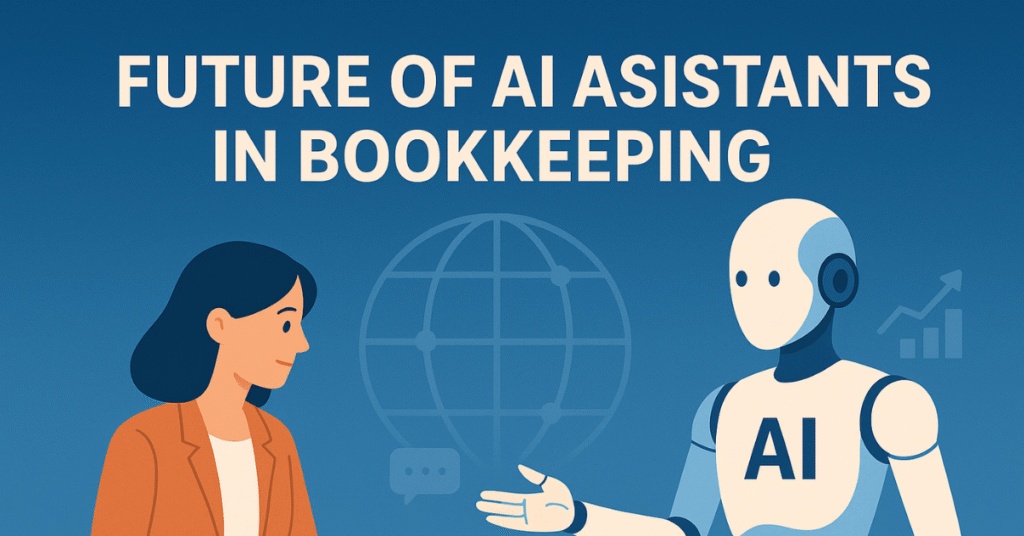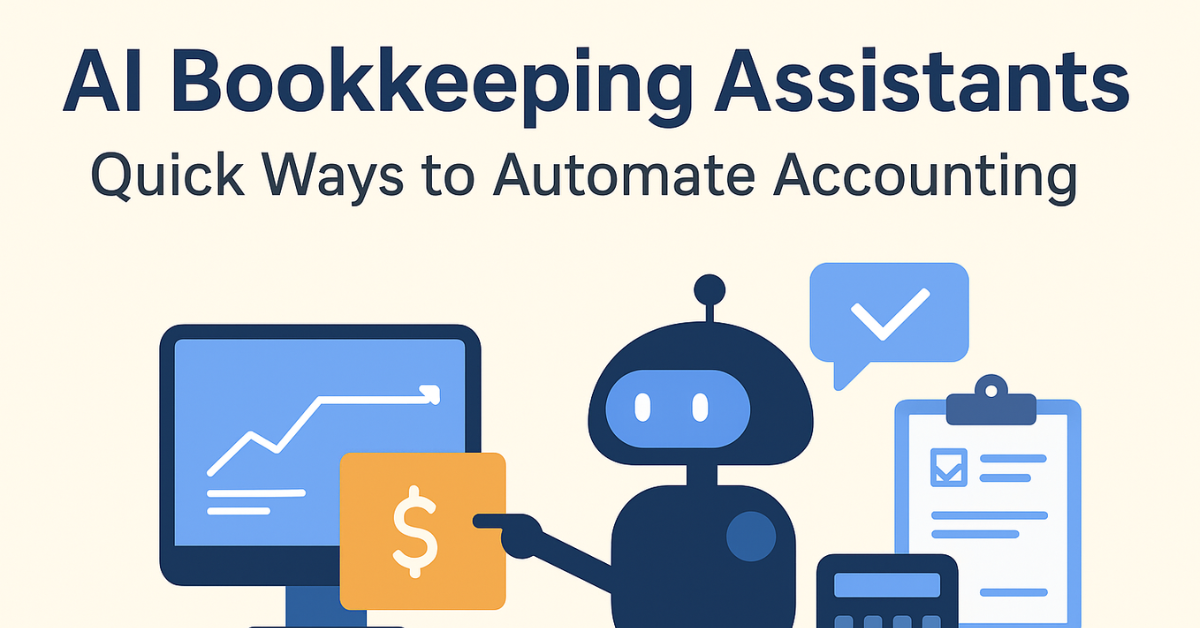Learn how AI bookkeeping assistants can take the headache out of accounting, from tracking expenses to generating reports, while saving time, reducing errors, and giving you actionable insights.
Table of Contents
TL;DR
- Bookkeeping eats time; AI bookkeeping assistants give you those hours back.
- No more typos, missed invoices, or messy reconciliations—AI assistants keep it clean.
- Real-time reports mean you always know where your money stands.
- AI assistant isn’t just reactive—it forecasts, flags weird activity, and helps you prep for what’s next.
- Bookkeeping AI agents are not about replacing accountants; they are about making life easier for business owners.
Let’s be honest; most business owners don’t start a company because they love bookkeeping.
Between tracking receipts, sending invoices, reconciling bank statements, and generating reports, it can eat up hours every week. And the worst part? Mistakes happen, stress builds, and you barely have time to focus on your business.
That’s where AI bookkeeping assistants, like Luca AI, QuickBooks Intuit Assist, and Xero, come in. Think of them as your digital team mate that handles the boring stuff so you can focus on growing your business.
Even Forbes has noted that AI is already taking over routine accounting work, cutting down on errors and giving business owners more time to focus on what matters.
Here’s everything you need to know about them.
What Is an AI Bookkeeping Assistant?
An AI bookkeeping assistant is an AI work agent or agent that automates many of the core bookkeeping functions. Think of them as a virtual accountant that never sleeps, never makes typos, and never complains. They can:
- Automatically categorize expenses
- Generate and send invoices
- Reconcile bank transactions instantly
- Produce real-time reports (profit and& loss, balance sheets, cash flow)
- Predict trends and flag anything unusual
What sets AI apart from traditional accounting software is its ability to learn and adapt.
Eric Bai, Founder & CEO of Alpharithm Investments and creator of AI Work, puts it this way:
AI bookkeeping assistants aren’t just faster; they’re smarter. They adapt, predict, and surface insights in real time, turning finance from a back-office chore into a strategic advantage.
The more information it processes, the smarter it becomes. Before you know it, it’s handling most of your bookkeeping tasks independently, giving you the freedom to concentrate on growing your business.
Key Features of AI Bookkeeping Assistants
1. Transaction Categorization
Manually tracking expenses is tedious and prone to error. AI assistants automatically categorize transactions based on historical patterns, vendor types, and spending behavior.
Industry Examples:
- Freelancers: categorize software subscriptions, client project costs, and travel expenses
- Retail: separate inventory purchases, operational costs, and marketing spend
- SaaS: track recurring revenue, cloud service fees, and payroll
Best Practice: Regularly review AI-suggested categories to fine-tune accuracy. Many assistants also use OCR scanning to automatically read receipts, reducing manual entry further.
Mini Case Study: A freelance designer using FreshBooks AI reduced categorization time from four hours per week to just 30 minutes, reclaiming hours for client work.
2. Invoice Management and Payment Tracking
Chasing payments is a common headache. AI bookkeeping assistants automate invoice creation, sending, and tracking. Many integrate with payment gateways like Stripe, PayPal, or bank APIs, so books update automatically when clients pay.
Benefits:
- Faster payments without chasing clients
- Eliminates forgotten or late invoices
- Clear visibility of outstanding receivables
Example: A small marketing agency using QuickBooks Intuit Assist reduced delayed payments by 25% in the first month, improving cash flow reliability.
Tip: For subscription-based businesses, recurring invoice automation ensures smooth revenue tracking without manual oversight.
3. Bank Reconciliation
Manual reconciliation is labor-intensive. AI assistants compare bank statements with accounting records in real-time, flagging discrepancies immediately.
Advantages:
- Saves hours each month
- Ensures error-free, clean records
- Flags unusual activity, like duplicate charges or missing deposits
Pro Tip: Businesses operating in multiple currencies or with multi-branch setups benefit from AI assistants like Xero or Zoho Books AI, which can reconcile accounts across regions effortlessly.
4. On-Demand Financial Reports
AI bookkeeping assistants generate instant financial statements, including profit and loss reports, balance sheets, and cash flow statements. This enables business owners to make informed decisions without waiting for month-end reporting.
Mini Case Study: A boutique e-commerce store using Luca AI generated real-time profit and loss statements to adjust mid-month marketing spend, improving ROI by 12%.
Actionable Tip: Use these reports to test “what-if” scenarios, such as evaluating the financial impact of hiring new staff, launching a new product line, or increasing advertising budgets.
5. Predictive Analytics for Smarter Decisions
One of the most powerful benefits of AI bookkeeping assistants is predictive insights. They forecast cash flow, identify seasonal trends, and detect unusual transactions that could indicate fraud.
Benefits:
- Prepare for busy or slow months ahead of time
- Avoid being blindsided by cash shortages
- Detect unusual spending early
Mini Case Study: A retail store using FreshBooks AI adjusted inventory before a seasonal slowdown, maintaining cash flow and avoiding overstock.
Tip: Use predictive insights to plan budgets, optimize staffing, or schedule vendor payments strategically.
Traditional vs AI Bookkeeping
| Task | Traditional Bookkeeper | AI Bookkeeping Assistant |
| Expense Tracking | Manual data entry | Automated categorization |
| Invoice Management | Paper/digital, slow | Auto-generate & reconcile |
| Bank Reconciliation | Hours of matching | Real-time reconciliation |
| Reporting | Delayed & error-prone | Instant, accurate reports |
Bookkeeping Tasks AI Assistants Can Automate
1. Expense Tracking and Categorization
Sorting through receipts and logging every little expense is one of those jobs nobody wants to do.
And honestly, it’s where a lot of mistakes sneak in. AI bookkeepers can take that off your plate. It learns your usual categories, auto-fills them, and lets you know if something looks weird, like a double charge or a subscription you forgot about.
It helps you get a clean, accurate view of where your money’s going without lifting a finger.
Why this matters:
- No more hours wasted typing in numbers
- Catches odd charges before they become a problem.
- You finally get real-time insight into your spending habits
2. Invoicing Without the Headache
Chasing payments is stressful and awkward; we’ve all probably been there.
Thankfully, AI accounting agents can handle the whole thing for you: creating invoices, sending them on time, and following up with reminders if someone’s late. Some even connect directly to payment apps, so once you’re paid, your books update automatically.
Why this matters:
- You get paid faster without chasing anyone
- No more “oops, I forgot to send that invoice” moments
- You always know when money’s coming in
3. Bank Reconciliation
Manually matching every single bank transaction with your books is the definition of busywork.
AI accountants automate that. They check your statements against your records, point out anything that doesn’t match, and save you from the “needle in a haystack” search.
Why this matters:
- Hours saved every single month
- Cleaner books and fewer headaches come with tax season
- Problems get flagged right away, not months later
4. Financial Reports On Demand
If you’ve ever pulled an all-nighter trying to prepare a profit and loss statement before a meeting, you’ll appreciate this one. AI bookkeeping assistants can generate reports: profit and loss, balance sheet, and cash flow; whenever you need them.
Why this matters:
- Reports are always ready when you are
- Tax compliance becomes a whole lot less stressful
- Let’s you test “what if” ideas, like hiring new staff or raising ad spend
5. Looking Ahead with Predictive Analytics
Here’s where things get really useful.
AI accountants don’t just track what’s already happened; they can also forecast what’s coming. That means spotting cash flow dips before they hit, seeing seasonal sales patterns, or even catching fraud. It’s like having a little financial crystal ball.
Why this matters:
- You can prepare for busy or slow months ahead of time
- No more being blindsided by cash shortages
- Potential fraud or unusual spending gets caught early
Benefits of AI Bookkeeping Assistants for Businesses

Whether you’re a freelancer juggling receipts, a small business owner wearing twelve hats, or a big company with finance teams stretched thin, AI bookkeeping assistants can make a world of difference.
They don’t just make the job easier, they make it faster, smarter, and a whole lot less stressful. A recent Thomson Reuters report highlights that professionals using AI tools can save up to five hours per week, increasing productivity while reducing strain.
Let’s break it down:
1. Time Savings: Snag Back 5–10 Hours Every Week
Nobody started a business because they love reconciling accounts. Manual bookkeeping can swallow entire afternoons you’ll never get back. But the good thing is an AI accountant takes the boring stuff off your plate so you can focus on what really matters.
Real Case Study: One real estate consultant switched to Luca AI and cut her weekly bookkeeping time from six hours to less than one. That’s five extra hours to earn more money or focus on other things.
2. Improved Accuracy: Bye-Bye Human Error
We all slip up sometimes. One extra zero, one forgotten payment, and suddenly your numbers don’t add up. AI doesn’t get tired or distracted once it’s set up; it can actually outdo humans when it comes to accuracy.
Think of it like a super-diligent bookkeeper who never blinks, never yawns, and doesn’t need coffee to stay sharp.
3. Cost Efficiency: Do More with Less
Good bookkeeping help isn’t cheap, whether you’re outsourcing or hiring. But AI bookkeeping assistants lighten the load, so you get more bang for your buck.
Here’s why it matters: Deloitte found finance teams using AI cut transactional accounting costs by up to 30%. That’s not pocket change, that’s money back into growing your business.
4. Better Decision-Making: Insights When You Need Them
Forget waiting until month-end to know if you’re in the red or green. AI accounting solutions give you answers on demand so you can make smarter moves, faster. How?
- Real-time dashboards show profit and loss whenever you want a peek.
- Spending patterns pop up automatically.
- Forecasting tools give you a heads-up about what’s coming next.
Real Case Study: A retail store uses Luca AI’s forecasts to prepare for seasonal slowdowns. Instead of panicking when sales dip, they adjust inventory early and keep cash flowing smoothly.
5. Scalability: Built to Grow With You
Accounting and bookkeeping don’t magically get easier as you scale; they get more complicated. The good news? AI accountants are built to grow with you. For example:
- Freelancers can start small with invoice automation.
- Small businesses can add forecasting and compliance tools as they expand.
- Enterprises can hook AI into their ERP systems to manage mountains of transactions with zero stress.
How to Get Started with an AI Bookkeeping Assistant

If you’ve ever thought,
“I wish someone else could just deal with this bookkeeping mess.”
…That’s exactly where AI assistants come in. And setting one up? Honestly, it’s way easier than you’d expect. But these steps make it easier:
1. Choose the Right Tool
Not all bookkeeping AI tools are built the same.
Some are perfect for freelancers who just need basic invoicing and expense tracking. Others are full-throttle solutions for larger businesses with payroll, multi-account reconciliations, and forecasting needs. So pick based on your actual needs, not just features.
2. Connect Your Financial Data
Once you’ve picked your tool, it needs real financial data to work with.
That means linking your bank accounts, invoicing platforms (like Stripe or PayPal), payroll, and expense tracking tools. Yes, it can feel like handing over your diary. But top AI accounting solution providers like AI Work use encryption and bank-level security (the same kind your bank uses), so your data stays safe.
Once connected, your AI assistant can instantly start recognizing patterns like rent, software subscriptions, or client payments without you manually tagging them every time.
3. Set Your Automation Rules
Here’s where you hand your AI assistant the playbook.
If you want your coffee shop runs logged under “Meals & Entertainment,” rent flagged as recurring, or invoices auto-reminded after seven days late, you’d need to set up the rules.
These rules act like little shortcuts, so the AI just “knows” what to do in different scenarios. The more you teach it upfront, the less you’ll have to touch down the line.
4. Review and Approve
At first, you’re still the coach on the sidelines.
Check in and make sure your assistant isn’t misclassifying Uber as “Office Supplies.” But don’t worry; these tools are quick learners. After a few weeks, your review time will shrink to just a quick weekly check.
Here are Real-World Applications of AI in Accounting
AI bookkeeping isn’t theory; it’s already reshaping how freelancers, SMBs, and enterprises run their numbers. Let’s look at how it plays out in the real world:
Freelancers & Small Businesses
When you’re running solo or with a small team, every hour is precious. Spending time chasing receipts or nagging clients about overdue invoices eats into billable hours.
How AI Assistants Help:
- Categorizes expenses directly from bank feeds or receipts
- Generates and sends invoices on autopilot
- Provides instant cash flow visibility (no more waiting until month-end)
Example: A freelance designer using Luca AI or QuickBooks AI can:
- Automatically categorize PayPal deposits as “client income”
- Send recurring invoices for subscription-based clients
- Get notified when a payment is overdue
Result: Saves 5–8 hours a week and avoids cash flow headaches from missed payments.
Mid-Sized Companies
With more employees, more transactions, and more moving parts, bookkeeping gets messy fast.
How AI Assistants Help:
- Forecasts future cash flow based on historical data
- Flags unusual expense spikes
- Automates tax compliance reports
- Generates scenario-based financial forecasts
Example: A 200-person e-commerce brand using Luca AI or Xero AI can:
- Predict quarterly revenue
- Spot anomalies in vendor payments
- Prepare for holiday-season cash shortages by adjusting supplier terms
Result: They make proactive decisions, reduce financial risk, and use budgets more strategically.
Large Enterprises
At enterprise scale, manual bookkeeping isn’t even an option anymore. You’re dealing with global transactions, compliance rules across countries, and mountains of daily reconciliations.
How AI Accountants Help:
- Integrates with ERP systems like SAP or Oracle NetSuite
- Automates high-volume reconciliations
- Detects fraud by flagging unusual patterns
- Produces real-time consolidated reports across subsidiaries
Real Example: A multinational manufacturer connects Luca AI to its ERP system. With thousands of daily transactions across 15 subsidiaries, the AI work agent reconciles everything instantly and flags suspicious activity.
Result: 95% faster reconciliations, lower audit costs, and airtight compliance.
Future of AI Assistants in Bookkeeping

Let’s be real: AI won’t replace accountants, but it’s absolutely going to change how they work. Instead of spending hours on repetitive tasks, finance pros will focus on higher-level strategy and insights.
Here’s where bookkeeping is headed:
1. Voice-Activated AI Accounting Assistants
Imagine just asking your assistant:
- “Show me last month’s cash flow report.”
- “Reconcile yesterday’s bank transactions.”
- “How much did we spend on marketing this quarter?”
With voice tech (think Siri, Alexa, ChatGPT), financial management will feel as easy as talking to a colleague.
2. Deeper ERP and Business System Integrations
Right now, AI assistants sync with tools like QuickBooks or Xero. Soon, they’ll integrate across entire business ecosystems.
What That Means:
- Instant syncing with CRM, HR, payroll, and inventory
- CFOs get full visibility into both financial and operational data
- Less siloed data, smoother decision-making
Imagine an AI accounting agent that links your sales forecasts from CRM straight into your budget projections.
3. Enhanced Fraud Detection and Compliance
Fraud is a billion-dollar problem. AI will get even sharper at stopping it.
Future Capabilities:
- Scan billions of data points in real time
- Adapt continuously to new fraud tactics
- Automate compliance with global tax and audit standards
4. Predictive & Prescriptive Insights
Today, AI accounting agents can forecast and flag risks. Tomorrow, it’ll suggest solutions.
Example: Instead of just warning you about a cash shortage, advanced AI work agents,like Luca AI, might recommend negotiating supplier terms or offering customer discounts for early payment.
This is where accountants shift from “number crunchers” to strategic advisors powered by AI.
5. Hyper-Personalized AI Assistants
AI tools will evolve to fit businesses of all sizes:
- Freelancers: lightweight, affordable invoice + expense tracking
- SMBs: forecasting, budgeting, compliance features
- Enterprises: ERP-level automation and fraud protection
FAQs
Will AI bookkeeping assistants replace human accountants?
Nope. AI takes care of repetitive stuff, but strategy, financial modeling, and advisory work still need human brains.
Can small businesses afford AI bookkeeping software?
Yes. Most tools are subscription-based or pay-per-transaction, making them budget-friendly for SMBs and freelancers.
How accurate are AI bookkeeping assistants?
Once set up, AI accuracy can exceed 95% for everyday bookkeeping.
How long does implementation take?
For small businesses, a few weeks. For enterprise ERP integrations, 1–3 months is realistic.
Final Thoughts on AI Bookkeeping Assistants
AI bookkeeping assistants aren’t “the future,” they’re already here, affordable, and game-changing.
By taking over repetitive tasks, improving accuracy, and delivering insights in real time, they free accountants and business owners to focus on what really matters: strategy, growth, and innovation.
Whether you’re freelancing, scaling a small business, or running a global enterprise, now is the time to start experimenting with AI bookkeeping. The earlier you adopt, the faster you’ll scale smarter, move faster, and stay ahead of the competition.
Wondering where to start?
Luca AI is a purpose-built AI accountant for effortless bookkeeping and financial reporting.

